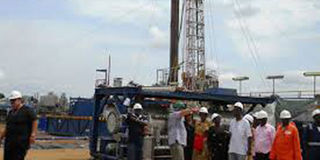Don’t sideline women in oil sector

What you need to know:
The oil and gas industry in Uganda, with a promising anchor for good services and infrastructure development as well as provision of jobs and improved wellbeing of people, is still a dream for majority citizens.
Women in Uganda constitute 50.27 per cent of the population. The country also has the youngest population in the world (between 15-30 years of age). These statistics come with challenges in terms of opportunities and service provision from the government and other stakeholders.
The oil and gas industry in Uganda, with a promising anchor for good services and infrastructure development as well as provision of jobs and improved wellbeing of people, is still a dream for majority citizens.
The Land Act, Cap 227 1998 (as amended in 2010) Section 42 empowers government and local governments to acquire land for public interest while Section 77 deals with matters to do with computation of any due compensation. Its these computations that have caused breakdown in family and relationship structures,
Livelihood and farming practices, access to education, health facilities and cultural practices, have continued to be affected negatively. Huge expectations from oil and gas industry are for bettering lives of the people and more so communities affected by the oil and gas project. In areas where schools and health facilities were promised to be relocated, it took long for that to happen.
For instance, people who opted to be given houses realised that the houses are congested and the pit-latrines are to close to the houses. This contradicts the previous spacious settings and negates people’s cultural norms. Besides, there is no water source within walkable distances.
In both public hearings for Tilenga and Kingfisher projects, women and youth have questioned the Joint Venture Partners (JVP, Total E&P and CNOOC) about the promised employment and compensationdelays.
The Civil Society Coalition on Oil and Gas (CSCO), in its infrastructure fact-finding mission, established and confirmed that indeed the built up houses in Kyakaboga are congested and there are also water and sanitation challenges. CSCO also found gender is still a critical issue in regard to employment opportunities. For instance, at Hoima International Airport, 69 women out of 590 are employed but largely as casual labourers.
Compensations have led to family breakdowns as men run away with all the money despite efforts put in place to have both husband and wife as signatories. In several communities, due to culture and customs, women do not own land. These efforts are always challenged and frustrated by men who end up in urban centres.
Sam Mucunguzi
[email protected]
> marrying young girls leaving their children with in the care of mothers who are landless. CSCO has advocated for compensation to be given wife and husband to address this issues, it was adopted and being practiced despite challenges with in there.
Livelihood and farming practices which is 90% dominated by women and youths, provide food and little subsistence income for family basic needs, however, women and youths don’t own the important resource which is land, this puts their efforts in fragile position if they don’t submit to the men’s demands who are seen as landlords.
Majority of men don’t engage in agriculture production and are always in centers dinking, riding Boda bodas and fishing making them always absent at home. So, for one to appreciate the oil and gas industry opportunities and challenges, dynamics in local cultural customs must be considered to influence major directions and behaviors of these people.
Unless properly managed, involuntary resettlement may result in long-term hardship and impoverishment for the Affected Communities and Persons, as well as environmental damage and adverse socio-economic impacts in areas to which they have been displaced. However, where involuntary resettlement is unavoidable, it should be minimized and appropriate measures to mitigate adverse impacts on displaced persons and host communities should be carefully planned and implemented.
The government often plays a central role in the land acquisition and resettlement process, including the determination of compensation, and is therefore an important third party in many situations. Experience demonstrates that the direct involvement of the client in resettlement activities can result in more cost-effective. (Performance Standard 5, Land Acquisition and Involuntary Resettlement IFC PS5).
As Civil Society Coalition on Oil and gas (CSCO), our advocacy to government and JVP is to implement these national and international best practices in acquiring land to see that women and youths lives are improved not depressed.
The writer is,
Sam Mucunguzi
Member of CSCO




